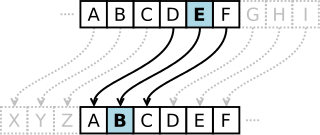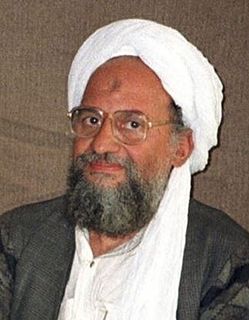Related Research Articles

Al-Qaeda is a multinational militant Sunni Islamic extremist network composed of Salafist jihadists. It was founded in 1988 by Osama bin Laden, Abdullah Azzam, and several other Arab volunteers during the Soviet–Afghan War.

In cryptography, encryption is the process of encoding information. This process converts the original representation of the information, known as plaintext, into an alternative form known as ciphertext. Ideally, only authorized parties can decipher a ciphertext back to plaintext and access the original information. Encryption does not itself prevent interference but denies the intelligible content to a would-be interceptor.
Kerberos is a computer-network authentication protocol that works on the basis of tickets to allow nodes communicating over a non-secure network to prove their identity to one another in a secure manner. Its designers aimed it primarily at a client–server model, and it provides mutual authentication—both the user and the server verify each other's identity. Kerberos protocol messages are protected against eavesdropping and replay attacks.

In cryptography, a Caesar cipher, also known as Caesar's cipher, the shift cipher, Caesar's code or Caesar shift, is one of the simplest and most widely known encryption techniques. It is a type of substitution cipher in which each letter in the plaintext is replaced by a letter some fixed number of positions down the alphabet. For example, with a left shift of 3, D would be replaced by A, E would become B, and so on. The method is named after Julius Caesar, who used it in his private correspondence.

Ayman Mohammed Rabie al-Zawahiri is an Egyptian terrorist known for being the leader of terrorist group al-Qaeda since June 2011, succeeding Osama bin Laden following his death, and is a current or former member and senior official of Islamist organizations which have orchestrated attacks in Asia, Africa, and also some in North America and Europe. In 2012, he called on Muslims to kidnap Western tourists in Muslim countries.

The Clipper chip was a chipset that was developed and promoted by the United States National Security Agency (NSA) as an encryption device that secured "voice and data messages" with a built-in backdoor that was intended to "allow Federal, State, and local law enforcement officials the ability to decode intercepted voice and data transmissions." It was intended to be adopted by telecommunications companies for voice transmission. Introduced in 1993, it was entirely defunct by 1996.
Cryptography, the use of codes and ciphers to protect secrets, began thousands of years ago. Until recent decades, it has been the story of what might be called classic cryptography — that is, of methods of encryption that use pen and paper, or perhaps simple mechanical aids. In the early 20th century, the invention of complex mechanical and electromechanical machines, such as the Enigma rotor machine, provided more sophisticated and efficient means of encryption; and the subsequent introduction of electronics and computing has allowed elaborate schemes of still greater complexity, most of which are entirely unsuited to pen and paper.
End-to-end encryption (E2EE) is a system of communication where only the communicating users can read the messages. In principle, it prevents potential eavesdroppers – including telecom providers, Internet providers, malicious state bodies, and even the provider of the communication service – from being able to access the cryptographic keys needed to decrypt the conversation.
Hassan Ghul, born Mustafa Hajji Muhammad Khan, was a Saudi-born Pakistani member of al-Qaeda who revealed the kunya of Osama Bin Laden's messenger, which eventually led to Operation Neptune Spear and the death of Osama Bin Laden. Ghul was an ethnic Pashtun whose family was from Waziristan.

Al-Qaeda in Iraq or Al-Qaeda in Mesopotamia, officially known as Tanzim Qaidat al-Jihad fi Bilad al-Rafidayn or TQJBR, was an Iraqi Sunni Islamic Jihadist organization affiliated with al-Qaeda, for two years.
There have been several videos released showing current Al-Qaeda leader Ayman al-Zawahiri.

Cryptography, or cryptology, is the practice and study of techniques for secure communication in the presence of adversarial behavior. More generally, cryptography is about constructing and analyzing protocols that prevent third parties or the public from reading private messages; various aspects in information security such as data confidentiality, data integrity, authentication, and non-repudiation are central to modern cryptography. Modern cryptography exists at the intersection of the disciplines of mathematics, computer science, electrical engineering, communication science, and physics. Applications of cryptography include electronic commerce, chip-based payment cards, digital currencies, computer passwords, and military communications.
Abdel-Hakim al-Hasidi is a leading member of the Libyan Islamic Fighting Group and a commander of the 2011 Libyan civil war anti-Gaddafi forces.
Abu Khalil al-Madani, also known as Abu Khalil al-Sudani, was a member of al-Qaeda's Shura Council. Believed to be a Saudi, little was known about his views, however in a 2013 audio message released online, he repeated familiar Al Qaeda themes of the Muslim world being weakened by a lack of Islamic faith and American conspiracies. In April 2014, al-Madani released an audio statement attempting to mediate the conflict between Syrian-based Jihadist groups, Al-Nusra Front and the Islamic State of Iraq and the Levant.
In Iraq in June 2006, two soldiers of the United States Army were abducted and later murdered and mutilated by members of the Mujahedeen Shura Council, during a time when military forces of the U.S. and a dozen other countries were conducting military operations in Iraq to "bring order to parts of that country that remain[ed] dangerous".
Steven Stalinsky is an expert on the Middle East, terrorism and terrorist use of the Internet, and encryption technologies, and has served as Executive Director of the Middle East Media Research Institute (MEMRI) since 1999. Since 2006, his research has focused on detailing and developing strategies against cyber jihad, describing how terrorist groups such as Al-Qaeda, ISIS, and others use the Internet, social media, and encryption for propaganda, recruiting, and hacking. He was an early advocate of calling on the tech community to take stronger action on removing terrorist content from their platforms and for creating industry standards to combat it.
Abdullah Abd al-Rahman Muhammad Rajab Abd al-Rahman, known as Ahmad Hasan Abu al-Khayr al-Masri, was an Egyptian al-Qaeda leader who has been described as the general deputy to al-Qaeda leader Ayman al-Zawahiri.
The Signal Protocol is a non-federated cryptographic protocol that can be used to provide end-to-end encryption for voice calls and instant messaging conversations. The protocol was developed by Open Whisper Systems in 2013 and was first introduced in the open-source TextSecure app, which later became Signal. Several closed-source applications have implemented the protocol, such as WhatsApp, which is said to encrypt the conversations of "more than a billion people worldwide" or Google who provides end-to-end encryption by default to all RCS-based conversations between users of their Messages app for one-to-one conversations. Facebook Messenger also say they offer the protocol for optional Secret Conversations, as does Skype for its Private Conversations.

My Journey into the Heart of Terror: Ten Days in the Islamic State is a 2016 memoir by German journalist Jürgen Todenhöfer. Todenhöfer was the first western journalist to travel to the self-proclaimed Islamic State (ISIS), alternatively known as ISIL, to find out the cause of the fighting in Iraq and Syria. He describes the experience he and his son went through during the journey in his memoir. Todenhöfer rejects the description 'Islamic terrorism' and considers the acts of ISIS fighters as non-Islamic.

Fractal is an instant messaging client and collaboration software for the GNOME desktop based on the Matrix protocol.
References
- ↑ Schmiitt, Eric. "Qaeda Plot Leak Has Undermined U.S. Intelligence". New York Times. Retrieved 14 May 2014.